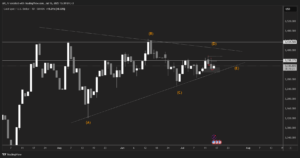Gold prices have risen in global trading today, moving close to the record highs reached recently, fueled by a slowdown in the US labor market and statements from the Federal Reserve. Traders are awaiting the US inflation report for new clues on the timing of interest rate cuts.
Gold had hit a record high of $2194.99 for the fourth consecutive day on Friday after data showed a slowdown in the US labor market. Economic data showed that the US economy added 275,000 jobs, higher than the expected 198,000 in February, while the unemployment rate rose to its highest level in 25 months at 3.9% from 3.7% the previous month.
The markets are now looking ahead to the Consumer Price Index (CPI) data for February due to be released tomorrow, Tuesday, which is likely to be the biggest driver of gold prices over the week given that the US Federal Reserve is currently in a blackout period. A lower-than-expected reading of the US CPI could help boost the case for an early rate cut, supporting gold prices. Federal Reserve Chairman Powell sounded more confident about cutting rates in the coming months in his testimony before Congress last week.
Traders are currently pricing in three to four (25 basis point) US rate cuts, with a 57% chance of the first one in June, according to the US Interest Rate Monitor available on the Investing Saudi website. Lower interest rates boost the attractiveness of the yellow metal, which does not yield a return.
Gold and the Dollar Now
Gold futures are now up 0.1% to $2188 an ounce. Spot gold is up 0.09% to $2181 an ounce. The US dollar index is flat at 102.330 points.
Other Metals
Spot silver fell 0.3% to $24.25. Platinum fell 0.1% to $911.84 an ounce. Palladium rose 0.3% to $1023.15.
Bitcoin Breaks $71,000 and Ethereum Hits New All-Time High
Bitcoin reached a new record high above $71,000 in the last few minutes of trading on Monday. The leading cryptocurrency has been rising steadily since the approval of Bitcoin ETFs in the United States. Bitcoin is now up about 2.5% in the last 24 hours, hitting $71,090 for the first time ever.
The popular digital currency had crossed $70,000 for the first time ever last week. Despite some experts predicting a major correction, the major cryptocurrency is still holding on to its gains, especially considering the massive rally that started from its lows of under $40,000 in January.
However, there is a major hurdle around the $70,000 level, which is a question mark in the current context. It is not entirely clear why some investors are selling at this stage of strong growth, but it is plausible that much of the selling pressure is coming from old miners.
Bitcoin’s ability to reach new all-time highs near $70,000 recently suggests there is potentially continued support for the rally ahead of the halving event scheduled for April. The fear of missing out (FOMO) theory is still attracting retail investors and other small participants at every new record high that Bitcoin reaches.
The record high above $71,000 means that Bitcoin has gained about 68% since the start of this year so far, and up to 222% on an annual basis, indicating the tremendous momentum that Bitcoin ETFs have added to the market. At the same time, Ethereum has crossed $4000 for the first time ever, and is currently trading at $4009. The global cryptocurrency market cap is currently at $2.63 trillion, with Bitcoin’s market cap accounting for 52.1% of the total market.
Oil Prices Fall on Concerns of Slowing Demand in China
Oil prices on Monday continued the losses they suffered last week on concerns of slowing demand in China, but ongoing geopolitical risks surrounding the Middle East and Russia limited the decline.
Currently, rising geopolitical risks will limit losses with the possibility of no ceasefire in the war between Hamas and Israel. The conflict between Russia and its neighbors could widen. China last week set its economic growth target for 2024 at 5%, which many analysts have described as ambitious without further stimulus.
China’s crude oil imports rose in the first two months of the year compared to the same period in 2023, but were weaker than previous months, continuing a downward trend in purchases by the world’s largest oil buyer. Brent crude futures fell 48 cents, or 0.6%, to $81.60 a barrel, while U.S. West Texas Intermediate crude fell 50 cents, or 0.6%, to $77.51.
For further insights, check OneRoyal’s Facebook, Instagram, and Twitter pages and expand your understanding of financial markets with global perspectives. Staying informed is crucial in the ever-evolving world of finance.
Disclaimer: This article is not investment advice or an investment recommendation and should not be considered as such. The information above is not an invitation to trade and it does not guarantee or predict future performance. The investor is solely responsible for the risk of their decisions. The analysis and commentary presented do not include any consideration of your personal investment objectives, financial circumstances, or needs.





